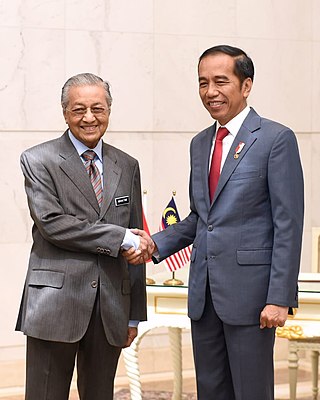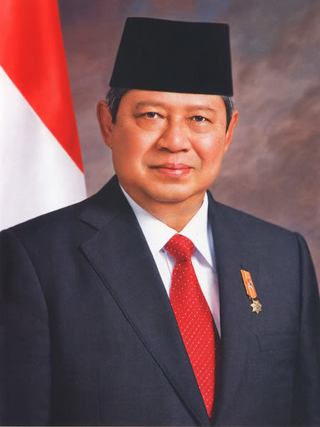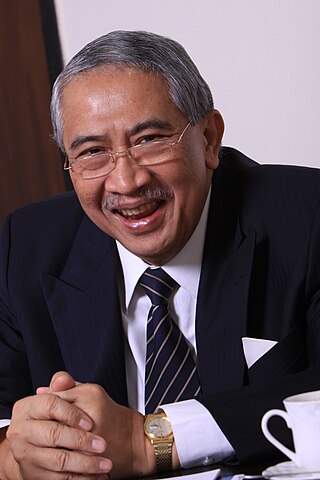Related Research Articles

Since independence, Indonesian foreign relations have adhered to a "free and active" foreign policy, seeking to play a role in regional affairs commensurate with its size and location but avoiding involvement in conflicts among major powers. During the presidency of Sukarno, Indonesia's foreign relations were marked by engagement with other newly independent nations in Asia and Africa, as exemplified by the Bandung Conference, the subsequent foundation of the Non-Aligned Movement and a confrontational attitude towards Western powers, justified by a belief in the CONEFO and opposition to what Sukarno termed as NEKOLIM.

Susilo Bambang Yudhoyono, commonly referred to as SBY, is an Indonesian politician and retired army general who served as the sixth president of Indonesia from 2004 to 2014 and the second Indonesian President from the military after Suharto. He founded the Democratic Party of Indonesia, he served as the 4th leader of the Democratic Party from 2014 until 2020, 8th and 10th Coordinating Minister of Politics and Security Affairs of Indonesia from 2000 until 2001, and again from 2001 until 2004. He also served as the president of the Assembly and chair of the Council of the Global Green Growth Institute. He was also the former chairman of ASEAN due to Indonesia's hosting of the 18th and 19th ASEAN Summits.
US$43 billion in International Monetary Fund (IMF) aid in 2003 was sent as foreign aid to Indonesia, and this assistance has traditionally been an important part of the central government's budget. From 1967 to 1991, most aid was coordinated through the Inter-Governmental Group on Indonesia (IGGI) founded and chaired by the Netherlands; since 1992, without the Netherlands, the organization has been known as the Consultative Group on Indonesia (CGI). Although Indonesia terminated its IMF aid program in December 2003, it still receives bilateral aid through the CGI, which pledged US$2.8 billion in grants and loans for 2004. Japan and the Asian Development Bank also have been key donors.

I Putu Sukreta Suranta was a high-level commander in Indonesia's army and a major figure in Parisada Hindu Dharma, he is also top figure of Pangestu.

The Sixth Development Cabinet was the Indonesian cabinet which served under President Suharto and Vice President Try Sutrisno from March 1993 until March 1998. The Cabinet was formed after Suharto was elected to a 6th term as President by the People's Consultative Assembly (MPR).

The Fourth Development Cabinet was the Indonesian cabinet which served under President Suharto and Vice President Umar Wirahadikusumah from March 1983 until March 1988. The cabinet was formed after Suharto was elected to a 4th term as President by the People's Consultative Assembly (MPR).
This is a list of some of the regions of Indonesia. Many regions are defined in law or regulations by the central government. At different times of Indonesia's history, the nation has been designated as having regions that do not necessarily correlate to the current administrative or physical geography of the territory of the nation.

Ide Anak Agung Gde Agung, alternatively spelled too as Ida Anak Agung Gde Agung, was an Indonesian ethnic-Balinese politician, historian, and National Hero, who was the Raja of Gianyar, Bali, and served as the prime minister of the State of East Indonesia from 1947 to 1949, and the Foreign Affairs Minister of Indonesia from 1955 until 1956.

The Natsir Cabinet was the first cabinet formed after the dissolution of the United Republic of Indonesia and returned to the Unitary State of the Republic of Indonesia. This cabinet was in charge from 6 September 1950 until 20 March 1951.

Indonesia and the Netherlands share a special relationship, embedded in their shared history of colonial interactions for centuries. It began during the spice trade as the Netherlands established the Dutch East Indies Company (VOC) trading post in what is now Indonesia, before colonising it as the Dutch East Indies until the mid-20th century. Indonesia was the largest former Dutch colony. In the early 21st century, the Dutch government has committed to boosting its relationship with Indonesia, noting that economic, political, and interpersonal contacts should be further strengthened.

Prof. Dr. Widjojo Nitisastro was an Indonesian economist, who was known as the main architect of the Indonesian economy during the New Order regime of President Suharto, serving as Minister for National Development (1971–1983) and Coordinating Minister for Economy, Finance and Industry (1973–1983). He was one of Indonesia's best-known and most respected economic policy-makers, both within Indonesia and overseas.

The Bali Process is an official international forum, established in 2002, to facilitate discussion and information sharing about issues relating to people smuggling, human trafficking, and related transnational crime and appropriate responses to these issues.

Diplomatic relations between European countries and Indonesia date back to 1949. Initially, European Union (EU)–Indonesia relations were facilitated through the EU–Association of Southeast Asian Nations (ASEAN) cooperation. Bilateral cooperation was continuously expanded and eventually the EU Delegation to Indonesia was opened in 1988. Economic and political dialogue between Indonesia and the EU takes the form of regular Senior Officials Meetings. In 2000 relations were further reinforced with the release of the European Commission's communication "Developing Closer Relations between Indonesia and the EU". In November 2013, the EU's high representative for foreign and security policy Catherine Ashton made her first official visit to Indonesia.
The Indonesia Project is a center of research and graduate training on the Indonesian economy at the Australian National University (ANU). It is located in the Arndt-Corden Department of Economics, Crawford School of Public Policy, part of the ANU College of Asia and the Pacific in Canberra. It was established in 1965 with an initial grant from the Ford Foundation.

Johannes Baptista Sumarlin was an Indonesian economist who served as Minister of Finance. Sometimes linked with the so-called Berkeley Mafia group of economic advisers which included senior Indonesian economists such as Widjojo Nitisastro, Emil Salim, and Ali Wardhana, Sumarlin held various important economics posts in the Indonesian government for many years until the late 1990s. He graduated from the Faculty of Economics, University of Indonesia (FEUI) in 1958. Positions held in government included, among others, Chairman of the Supreme Audit Agency, Minister of Finance, Chairman of the National Planning Agency (Bappenas), and Minister for Administrative and Bureaucratic Reform.

A wantilan is a Balinese pavilion (bale) used for activities involving large crowds. A wantilan is the largest type of bale in Balinese architecture. A wantilan is basically a large wall-less hall placed under a large multi-tiered roof. A wantilan as a public building is usually located at a village's main square or main junction and functions as an open hall to hold large community activities such as meeting halls or a public musical gamelan performance. A wantilan is also a religious building, an integral part of Balinese temples used to hold the Balinese cockfighting ceremony.

The Inter-Governmental Group on Indonesia (IGGI) was established in 1967 as an international consortium of official donors to coordinate the provision of foreign assistance to Indonesia. IGGI was the lead official grouping of donors to Indonesia from 1967 until early 1992 when it was abolished and replaced by the Consultative Group on Indonesia (CGI). For the 25 years up to 1992, IGGI was a key regional institution in Southeast Asia. It helped provide strong international support for Indonesia's economic recovery after the economic difficulties in Indonesia during the period of the Sukarno presidency in 1950s and 1960s.

The Ministry of National Development Planning/National Development Planning Agency is a ministry of the Republic of Indonesia that has the task to oversee government affairs in the field of national development planning to assist the President in organizing state government. The minister is responsible to the President. The Ministry of National Development Planning uses organizational units and resources within the National Development Planning Agency.

Prof. Dr. Anak Agung Gde Agung is the eldest son of Ide Anak Agung Gde Agung, the Raja of Gianyar (Bali), a founding father of modern Indonesia.

The 2022 G20 Bali summit was the seventeenth meeting of Group of Twenty (G20), which was held in Nusa Dua, Bali, Indonesia on 15–16 November 2022. Indonesia's presidency began on 1 December 2021, leading up to the summit in the fourth quarter of 2022. The presidency handover ceremony was held as an intimate event, in which the G20 presidency gavel was transferred from Italian Prime Minister Mario Draghi to Indonesian president Joko Widodo at the close of the Rome summit. Preceding the G20 Leaders Summit, a youth engagement group of the G20, Youth20 (Y20) held its Y20 Indonesia 2022 Summit in Jakarta and Bandung in July 2022.
References
- ↑ The 2003 Indonesian-language report by the Indonesian National Development Planning Agency, Bappenas, provides a very useful survey of the background to the establishment of the CGI and its activities up to 2003. The report can be accessed at Keberadaan Dan Peran Consultative Group for Indonesia (CG) Kajian dan Rekomendasi Kebijakaan Archived 2020-02-24 at the Wayback Machine [The Place and Role of the Consultative Group for Indonesia (CGI): Study and Policy Recommendations], Jakarta, 2003.
- ↑ "Indonesia makes case of CGI for more aid". Thejakartapost.com. 28 July 1999. Archived from the original on 5 March 2016. Retrieved 3 January 2016.
- ↑ "Record of the CGI meeting held in Bali in January 2003". worldbank.org. Archived from the original on 4 March 2016. Retrieved 2 April 2018.
- ↑ The work of the IGGI, including the events leading up the establishment of the CGI, are discussed in detail in J.A. Nekkers and P.A.M. Malcontent (eds), 2000, Fifty Years of Dutch Development Cooperation 1949-1999, The Hague: Sdu publishers.
- ↑ Countries represented were Australia, Austria, Belgium, Canada, Denmark, Finland, France, Germany, Italy, Japan, The Republic of Korea, New Zealand, Norway, Spain, Sweden, Switzerland, the United Kingdom, and the United States.
- ↑ Institutions attending were the International Monetary Fund, the International Finance Corporation, the International Fund for Agricultural Development, the UN Development Programme, the European Community, the Islamic Development Bank, the Kuwait Fund for Arab Economic Development, the Nordic Investment Bank, the Saudi Fund for Development, the UN Children's Fund, and the OECD.
- ↑ 'Donors Support Indonesia's Effort to Accelerate Recovery', 18 October 2000.
- ↑ World Bank, 2003, Twelfth Meeting of the Consultative Group on Indonesia', Washington DC.
- ↑ Speech by World Bank Indonesia Country Director, Andrew Steer, 20 January 2005
- ↑ Bappenas and the International Donor Community, 2005, Indonesia: Preliminary Damage and Loss Assessment: The December 26, 2004, Natural Disaster, prepared for The Consultative Group on Indonesia, January 19-20, 2005.
- ↑ Urip Hudiono (25 January 2007). "CGI no longer needed: President". Thejakartapost.com. Retrieved 2 April 2018.[ dead link ]
- ↑ Kornelius Purba (26 January 2007). "We won't lose pride as a great debtor nation". Thejakartapost.com. Retrieved 2 April 2018.[ dead link ]